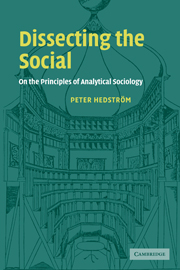Book contents
- Frontmatter
- Contents
- List of figures
- List of tables
- Preface
- 1 The analytical tradition in sociology
- 2 Social mechanisms and explanatory theory
- 3 Action and interaction
- 4 Social interaction and social change
- 5 On causal modelling
- 6 Quantitative research, agent-based modelling and theories of the social (with Yvonne Åberg)
- 7 Coda
- References
- Index
5 - On causal modelling
Published online by Cambridge University Press: 22 September 2009
- Frontmatter
- Contents
- List of figures
- List of tables
- Preface
- 1 The analytical tradition in sociology
- 2 Social mechanisms and explanatory theory
- 3 Action and interaction
- 4 Social interaction and social change
- 5 On causal modelling
- 6 Quantitative research, agent-based modelling and theories of the social (with Yvonne Åberg)
- 7 Coda
- References
- Index
Summary
So far this book has been exclusively concerned with theory. Chapter 2 focused on theories of explanation, chapter 4 on theories of action and chapter 3 on theories linking individual action to social outcomes. This chapter and the next are concerned with the relationship between theory and empirical research. In this chapter I continue the discussion started in chapter 2 about statistical explanations; chapter 6 illustrates how one can establish a close link between the type of theory discussed in previous chapters and quantitative empirical analyses. As will be seen below, I have many objections to the way quantitative research is conducted today, but I nevertheless believe that quantitative research is essential for sociology. Although qualitative research can be important for the development of explanatory theory, it lacks the reliability and generalizability of quantitative research, and this is critical if sociology is to be a rigorous science of the social.
The chapter is organized as follows. In the next section I describe the main currents of causal modelling. I then spell out in some detail why I find these traditions wanting. The discussion centres on four topics, (1) the weak theoretical foundation of many causal models, (2) the excessive importance given to predictive accuracy, (3) the lack of attention given to the role of social interactions, and (4) the focus on individual rather than social outcomes.
- Type
- Chapter
- Information
- Dissecting the SocialOn the Principles of Analytical Sociology, pp. 101 - 113Publisher: Cambridge University PressPrint publication year: 2005



